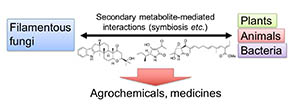Fungal secondary metabolites: biosynthesis, roles in symbiosis, and applications
 Filamentous fungi (molds) are versatile organisms. Filamentous fungi have ability to make medicines like penicillin and statins, and fermentation foods like sake. Furthermore, some filamentous fungi are known as plant and animal pathogens and mycotoxin producers. Filamentous fungi have been a major source of secondary metabolites. Recently, it has become apparent that huge numbers of secondary metabolism genes of unknown functions are sleeping in the genomes of filamentous fungi. We predict that some secondary metabolites are involved in biological interactions including symbiosis. We aim to elucidate the roles of fungal secondary metabolites in biological interactions, and to develop agrochemicals and medicines from fungal secondary metabolites involved in the interactions.
Filamentous fungi (molds) are versatile organisms. Filamentous fungi have ability to make medicines like penicillin and statins, and fermentation foods like sake. Furthermore, some filamentous fungi are known as plant and animal pathogens and mycotoxin producers. Filamentous fungi have been a major source of secondary metabolites. Recently, it has become apparent that huge numbers of secondary metabolism genes of unknown functions are sleeping in the genomes of filamentous fungi. We predict that some secondary metabolites are involved in biological interactions including symbiosis. We aim to elucidate the roles of fungal secondary metabolites in biological interactions, and to develop agrochemicals and medicines from fungal secondary metabolites involved in the interactions.
This project consists of the three research subjects as follows.
- Activation of fungal secondary metabolite biosynthetic gene clusters and analysis of the biosynthetic mechanisms
- Elucidation of the roles of fungal secondary metabolites in biological interactions including symbiosis
- Development of agrochemicals and medicines from fungal secondary metabolites
